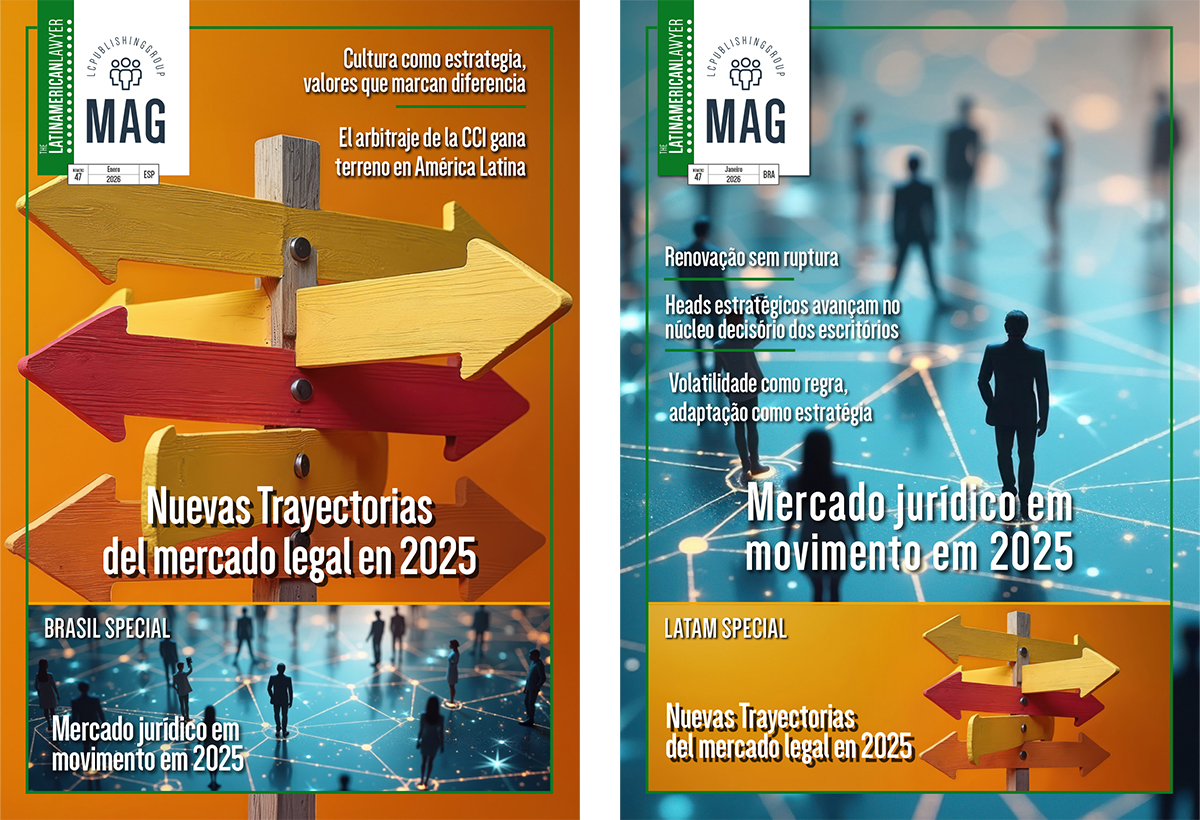Bouncing back

Mergers and acquisitions across Latin America had been brisk in 2019 and even up until, and during, the onset of the COVID-19 pandemic. But deals dried up in the second quarter of this year as the region endured lockdown. Anna Tavares de Mello, a partner at Trench Rossi Watanabe in Brazil, talked to us about the panorama going forward as the region’s economies reopen and investors line up to acquire distressed assets
By Adam Critchley
M&A recorded double-digit growth in the region in 2019, with a combined value of $85.9 billion, an increase of 12.4 per cent on 2018, according to Mergermarket, despite the number of deals dropping slightly, from 675 to 659. The region also bucked the global trend, as deal values dropped by 6.9 per cent worldwide last year.
That trend looked set to continue, but M&A purse strings tightened in Latin America in the second quarter of this year however, with the region recording the sharpest drop in transactions globally, with deal value crashing by 95 per cent compared with the second quarter of 2019, while deal volume declined by 61 per cent, according to a report by law firm White & Case.
Among the deals that have closed in Latin America since the arrival of the pandemic were the purchase of Brazilian oil and gas fields by UK-based Trident Energy, as part of state-owned oil and gas company Petrobras’ asset divestment, and which marked Trident’s entry into Brazil, an $851 million deal in which the British company was advised by law firm Pinheiro Neto, and which also advised local online payment services company PagSeguro on its acquisition of Wirecard Brazil, the first asset disposal by Germany-based Wirecard following its collapse earlier this year after an accounting scandal.
Other deals closed in midpandemic include the $145.6 million purchase of a São Paulo office tower by Fundo de Investimento Imobilário, and which was advised by Lefosse Advogados, Brazilian private equity fund Fundo de Investimento em Participações Multiestratégia Performa Key de Inovação’s purchase of a stake in Contech Produtos Biodegradáveis, with the former counselled by TozziniFreire, and the sale of a Bogotá shopping centre by Colombian private equity firm Fondo de Capital Privado Nuevomundo, which was advised by Gómez-Pinzón, to Chile’s Mallplaza for an undisclosed amount.
In addition to the sale of distressed assets, some countries such as Brazil and Ecuador are planning privatisations, and which in the case of Brazil were planned for this year. The government of President Jair Bolsonaro plans to raise 1.3 trillion reais (around $323 billion) from privatisation, including of airports, ports, the staterun electric power company Eletrobras and the post office.
For an up-close and expert view on the panorama for M&A in the region, we spoke to Anna Tavares de Mello, a partner at Trench Rossi Watanabe, a member firm of Baker McKenzie, in Rio de Janeiro.
Q: Where do you see M&A opportunities arising in Latin America?
A: Brazil and Mexico are the countries where M&A deals have dropped less than in other countries, with not much difference between quarters, but Colombia and Peru for example, which saw a lot of deals last year, have seen the biggest drop. But even in Brazil and Mexico, where deals maintained their momentum, we are seeing much fewer multi-jurisdictional deals, but rather deals are now concentrated in-country. At the beginning of the pandemic, for the first two months, we saw a slowdown in all of Latin America as we all tried to adjust and adapt to the different lockdown strategies. We were all impacted, but in different ways. But after two months, we saw deals start again in Brazil, deals that had been put on hold restarted but in a fast-track mode, as companies were keen to close deals faster, especially those selling assets. Our firm in Brazil recovered after those first two months of the pandemic, and we were working the same number of hours as last year, which is a good sign.
Q: Are the Brazilian government’s privatisation plans still on track?
A: In Brazil we have had positive economic opportunities announced by the government, even though we are not at such a stable time. President Bolsonaro is a character and there have been issues with his speeches, and which caused confusion, but in August we heard the announcement of the privatisations, which will not happen this year but perhaps in the next 12 months. I believe the privatisations will happen. The government initially said they would take place this year, but we think now it will be next year. This has attracted a lot of interest among investors. Brazil is always seen as a place of opportunity and I think the recovery will be fast, and the privatisations will take place.
Q: What will be the most attractive assets within the privatization plan?
A: Eletrobras and the post office. Eletrobras is the jewel in the crown, it’s an attractive asset.
Q: In which sectors do you expect to see the most M&A deals as the pandemic eases?
A: Healthcare and technology. For obvious reasons. We all need both. Everything depends on technology these days, especially in the pandemic, for home working, home schooling, training, and all companies have a need to implement technology and invest in it. And also in healthcare and life sciences and pharma. As well as energy and infrastructure. And agribusiness. And not just in Brazil, but in most countries of the region. We have seen a lot of Asian investors coming to Brazil, as they have recovered already and are ready to buy. The Chinese investors especially, who are already looking for deals in the region. The entertainment, real estate and hospitality will be looking to restructure, they are suffering the most, and we will see distressed opportunities there, and private equity firms are looking, especially as assets are less expensive now because of the currency devaluation. Companies are looking to consolidate their businesses, to restructure or strike up joint ventures so that they can survive the crisis.
Q: But despite the attractiveness of assets, some companies and investors may still be hesitant to buy as they need to evaluate their targets given the uncommon situation this year, with the pandemic having impacted so many businesses’ performance.
A: Yes, this has been a very different, and much more profound, crisis than a regular economic crisis. We have seen in the law firm that clients are trying to close the gap in their evaluation of companies when carrying out due diligence. We are seeing that when you cannot predict how a company can perform, earn-out provisions are being negotiated, so that part of the purchase price is paid in the future based on the company’s performance. Sellers don’t like it, but it’s a way of bridging the gap in the evaluation of assets. Something else new that we are seeing is private equity firms looking to pay a lower price to then resell the asset later for a much higher price, and so we are seeing clauses put into contracts to give the seller the right to receive an amount due to the re-evaluation of the asset. Due diligence is much more focused right now on the solvency of companies than any time before.
 Q: Will deals necessarily take place as quickly in the ‘new normal’, post-pandemic?
Q: Will deals necessarily take place as quickly in the ‘new normal’, post-pandemic?
A: Sellers are still in need of cash and they want to avoid bankruptcy, and to avoid that they will be looking to sell quickly, even if it’s for a low price, to give them a cash injection. Some companies that are very stressed want to sell so that they can save the other piece of their business, and deals may develop very quickly because of that.
Q: Is Brazil seen as more stable by investors now, following the bribery and corruption scandals of ‘lava jato’, and the impeachment of former president Dilma Rousseff, followed by an interim government?
A: We came from several years of corruption and scandals, and so we all put a lot of hope into the new government creating economic stability for Brazil, but because Bolsonaro is such a controversial figure, combined with the moment, the economic scenario, all that was happening at the same time didn’t help and the government did not show immediate results. Even though I am not a big fan of Bolsonaro, I think he was able to create a government with credibility among the financial markets and investors. If the pandemic was not with us I think we would be doing much better now. But we had to change what we had before, we lost the credibility of the world with the ‘car wash’ scandal and the domino effect. And now, this year, we are starting to reopen the economy and things are starting to go back to ‘the new normal’.
Q: How is the law firm doing? People talk about times of crisis as being times of opportunity, is that the case for Trench Rossi Watanabe now?
A: We are doing well, we are a full-service law firm and that helps when you have to deal with crises, when you have different areas, so that if you don’t have opportunities in one area you will have them in other areas. Some areas will have less work but you compensate with more work in other practices. In the pandemic we had a lot of work in our labour team, they were busier than ever because companies needed to terminate employees, reduce their work hours, etc. And that was happening right across Latin America. Law firms would have had a lot of work in this area, while M&A and deals were also ongoing, due to companies booming or because of the stress they were under. So, our corporate and restructuring teams were very busy. You always have practices that are booming and other that don’t do so well. But comparing our revenues this year and last year, we have not seen a reduction. I am optimistic and I see a lot of opportunities, things will start to grow again, some companies will have cash and they will want to invest. We have a lot of IPOs going on, and we didn’t expect that area to recover so quickly, but it did.















